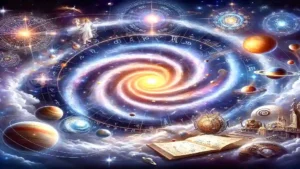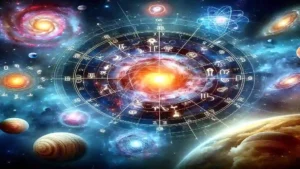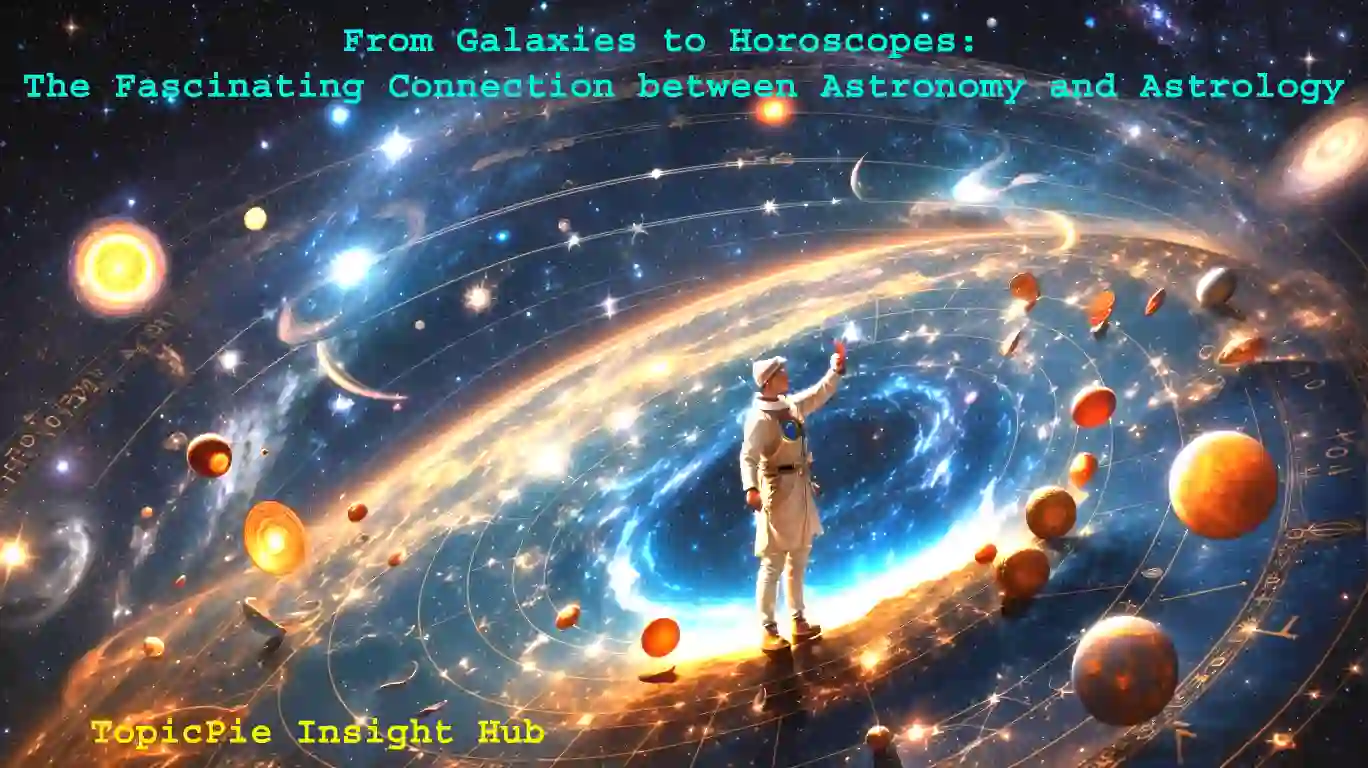Unveiling the secrets of the universe, astronomy and astrology have captivated human beings for centuries. Gazing at distant galaxies captivates, revealing a connection that transcends time. Deciphering zodiac mysteries adds fascination to these ancient disciplines. But what exactly sets them apart? Embark on a captivating journey through stars and horoscopes. Explore the intricate relationship between astronomy and astrology, from shared origins to modern-day divergence. Get ready to embark on a celestial adventure that will leave you starry-eyed!
So, sit back, relax, and let us unlock the cosmic wonders within the realms of science. Simultaneously, delve into the mysticism that adds another layer to our celestial adventure.
Overview: What is the difference between astronomy and astrology?
Astronomy and astrology, two terms often used interchangeably, are distinct in their practices and interpretations. At its core, astronomy is the scientific study of celestial objects, such as stars, planets, galaxies, and other cosmic phenomena. Astronomers meticulously observe and analyze these entities to understand their composition, behavior, and interactions.
On the other hand, astrology delves into the mystical realm of divination by examining how celestial bodies influence human affairs. It interprets celestial positions to predict personalities. Movements at specific times correlate with events, guiding predictions about destinies.
While astronomy relies on empirical evidence gathered through telescopes and advanced instruments, astrology leans on ancient beliefs for interpretation. Astrology interprets celestial positions based on ancient beliefs, while astronomy relies on empirical evidence gathered through advanced instruments.
In short, astronomy uses scientific methods grounded in empirical data to unravel the mysteries of the vast universe. Astrology aims to uncover insights about individuals’ lives through an intricate system rooted in ancient myths and symbols.
Although both disciplines share a historical connection that dates back thousands of years ago when science was intertwined with spirituality or mysticism – they have evolved differently over time. Astronomy has progressed as a rigorous scientific field while astrology has retained its esoteric nature despite some modern adaptations.
Whether you’re peering through a telescope or consulting your zodiac chart, understanding the difference is essential. Astronomy seeks knowledge in space’s grandeur; astrology explores cosmic influences on personal experiences.
Historical divergence: The ancient connection between astronomy and astrology
In ancient times, the lines between astronomy and astrology were blurred. Both disciplines shared a common origin and were intertwined in their pursuit of understanding the celestial bodies.
The ancient civilizations of Mesopotamia, Egypt, Greece, and India all saw a deep connection between the stars above and human destiny below. They believed that the movements of the planets and stars held profound significance for individuals and society as a whole.
Astronomy emerged as an observational science dedicated to studying celestial phenomena objectively. Scholars observed patterns in the night sky, tracked planetary movements, and created accurate calendars based on astronomical calculations.
Astrology, on the other hand, focused on interpreting these observations to determine how they influenced human lives. It was believed that each planet had its own characteristics associated with different aspects of life such as love, career success or health.
This intertwining continued until around 16th century when astronomy started diverging from astrology due to advancements in scientific methodology which began challenging astrological beliefs.
However, despite this divergence over time both fields have left lasting impacts on our society today. Astronomy has given us incredible knowledge about our universe while astrology continues to captivate individuals seeking insight into their personal destinies.
The ancient connection between astronomy and astrology also highlights the human desire to find meaning and purpose in the vastness of the cosmos. Both fields have played a crucial role in shaping our understanding of the world around us and will continue to do so for generations to come.
The Origins of Western Astronomy: Aristotle’s influence and the Pre-Socratics
Before we delve into the fascinating connection between astronomy and astrology, let’s take a moment to explore the origins of Western astronomy. In ancient times, long before telescopes adorned our skies, philosophers known as the Pre-Socratics pondered the mysteries of celestial bodies. These early thinkers believed that everything in the universe was composed of fundamental elements such as fire, air, earth, and water.
It was Aristotle who greatly influenced Western astronomy with his theories on celestial motion. He postulated that Earth was at the center of the universe and all other celestial objects revolved around it in perfect spheres. This geocentric model held sway for centuries until Copernicus challenged it with his heliocentric theory.
While many may dismiss these ancient beliefs as outdated or even superstitious, they laid an important foundation for future scientific inquiry. The study of astronomy owes much to these early philosophers who dared to question and seek answers about our place in the cosmos.
By examining their writings and ideas, we gain valuable insights into how human beings have sought to understand and interpret astronomical phenomena throughout history. It is through this lens that we can begin to appreciate both the historical significance and profound impact of Western astronomy on our modern understanding of space.
The Shared Origin of Astronomy and Astrology: The Ptolemaic Universe

The Ptolemaic Universe is a fascinating concept that showcases the shared origin of both astronomy and astrology. Developed by the ancient Greek astronomer Claudius Ptolemy, this geocentric model of the universe formed the basis for our understanding of celestial bodies for centuries.
According to Ptolemy’s theory, Earth was believed to be at the center of the universe, with all other planets and stars revolving around it in complex orbits. This intricate system was used not only to explain astronomical phenomena but also as a foundation for astrological interpretations.
In this worldview, each planet had its own unique characteristics and influences on human behavior based on its position in relation to Earth. Astrologers would study these planetary movements to make predictions about individuals’ personalities, relationships, and even future events.
While modern astronomy has long since dispelled the notion of Earth being at the center of the universe, there is no denying that our current understanding has been shaped by centuries of observing celestial bodies through both scientific exploration and astrological interpretation.
The Ptolemaic Universe represents an important milestone in our collective journey towards unraveling the mysteries of space. It reminds us that although astronomy and astrology have diverged over time, their shared origins continue to inspire curiosity about our place in this vast cosmos.
Astrology and Zodiac Signs in the Modern Age:
It is no secret that astrology and Zodiac signs have fascinated people for centuries, and their popularity shows no signs of waning in the modern age. Popular culture has long recognized the twelve zodiac signs as symbols associated with specific personality traits and characteristics.
With the rise of social media, astrology has taken on a whole new dimension. Thousands of people are able to access their horoscopes daily with a number of apps or websites that offer personalized readings based on their birthdate. As a result of this accessibility, millennials and Generation Z have become increasingly interested in astrology. (Gen Z refers to people born roughly from the mid-1990s to the early 2010s.)
Many individuals turn to astrology as a way to gain insights into themselves and navigate life’s challenges. Whether it’s seeking guidance on relationships or career choices, astrology offers a framework for understanding oneself better. While many may think these celestial patterns are merely entertainment or coincidence, others find comfort in believing that they have cosmic significance.
Astrology has also found a place in professional fields such as psychology and counseling. Therapists often use birth charts as tools for self-reflection and exploration in their work.
While some skeptics dismiss astrology as pseudoscience or superstition, others see it as a valuable tool for self-discovery and personal growth. It cannot be denied that astrology continues to captivate many individuals who find solace in its teachings despite one’s stance on the subject.
As society progresses further into the digital age, we can expect even more innovation within the realm of astrology – from AI-generated horoscopes to advanced algorithms predicting future trends based on astrological data. Humans will continue to seek meaning beyond what science can fully explain as long as astrology continues to evolve along with our fascination with the stars.
How Does Astrology Work?

Astrology, a mystical discipline that has captivated humans for centuries, is based on the belief that celestial bodies can influence our lives and personalities. But how does it actually work? Let’s explore this intriguing question.
At its core, astrology operates on the principle of cosmic interconnectedness. It suggests that the positions and movements of planets and stars at the time of our birth can provide insights into various aspects of our lives, such as love, career, and personality traits.
Astrologers use birth charts or horoscopes to map out these celestial influences. These charts are calculated based on an individual’s date, time, and location of birth. By analyzing planetary placements in relation to each other and specific areas of life represented by different houses in the chart, astrologers make predictions about future events or gain deeper understanding about one’s character.
Each planet is associated with certain qualities or energies which are then interpreted through zodiac signs. The twelve zodiac signs act as archetypes representing distinct personality traits or patterns of behavior influenced by these cosmic forces.
It is important to note that astrology does not rely solely on science-based explanations but also draws upon symbolism, intuition, and ancient wisdom passed down through generations. While skeptics argue against its validity due to lack of empirical evidence, many individuals find comfort in astrology’s ability to offer guidance or insights into their lives.
Whether you believe in astrology or not ultimately boils down to personal choice. Some view it as a valuable tool for self-reflection and personal growth while others dismiss it as mere pseudoscience. Regardless of one’s stance though, astrology continues to thrive as a fascinating subject that bridges the gap between science and spirituality.
Modern Natal Astrology: Is Reconciliation Possible Between Astronomy and Astrology in the Modern Age?
In the world of astrology, there is a constant debate about its compatibility with modern science, particularly astronomy. Many skeptics argue that astrology is nothing more than pseudoscience, while others believe that it holds valuable insights into human behavior and personality traits. So, can these two disciplines be reconciled in the modern era?
Natal astrology, also known as birth chart or horoscope interpretation, analyzes an individual’s cosmic blueprint at birth. It considers celestial bodies like planets and stars to determine personal characteristics and life events. Some view it as wishful thinking, while others see it as a powerful tool for self-discovery.
On the other hand, astronomy deals with the scientific study of celestial objects and phenomena. It relies on empirical evidence gathered through observation and measurement to explain how our universe works. Astronomers utilize advanced telescopes and sophisticated instruments to explore distant galaxies, black holes, and exoplanets.
Also Read: Ram Janmabhoomi to Ram Mandir: A Journey of Faith and Belief
While there are clear differences between these two disciplines in terms of methodology and approach, they both share a common origin rooted in ancient civilizations’ fascination with the stars above. Both astronomers and astrologers seek knowledge about our place in the cosmos; they just use different lenses to do so.
It’s important to recognize that today’s natal astrology has evolved significantly from its ancient roots when astronomical observations were less precise. Modern astrologers often incorporate psychological interpretations alongside traditional astrological techniques.
Some experts suggest embracing the distinct fields separately but acknowledging their shared historical connection. Astronomy pushes boundaries, exploring new frontiers beyond our planet, offering a deeper understanding of the vast universe.
At the same time, astrology can serve as a tool for introspection – helping individuals navigate their own lives and find meaning within the cosmic dance of planets. By recognizing and respecting the boundaries and differences between these disciplines, we can appreciate the unique insights they both offer.
While reconciling astronomy and astrology may be challenging, there’s room for both to coexist in the modern era. Each offers valuable perspectives on our universe. Embracing this diversity allows continual learning and growth for individuals and society.
Solving Critical Problems with Astronomy: The search for extraterrestrial intelligence
One of the most fascinating and complex challenges in astronomy today is the search for extraterrestrial intelligence. Scientists, armed with powerful telescopes and advanced technology, are tirelessly scanning the vastness of space for any signs of intelligent life beyond our planet.
The quest to find evidence of extraterrestrial civilizations has captivated our imaginations for centuries. It raises profound questions about our place in the universe and whether we are alone or not.
Astronomers employ a variety of methods to detect potential signals from alien civilizations. They listen for radio waves, looking for patterns that could indicate intentional communication. They also study exoplanets – planets outside our solar system – searching for habitable conditions that could support life as we know it.
However, this pursuit is not without its challenges. The distances between stars are immense, making it difficult to detect faint signals across such vast cosmic distances. Additionally, there is no guarantee that other civilizations use the same forms of communication as humans do.
Nonetheless, astronomers remain undeterred in their efforts to solve this critical problem. Advancements in technology continue to push the boundaries of what is possible in detecting and deciphering any potential messages from outer space.
The search for extraterrestrial intelligence encompasses both scientific inquiry and philosophical contemplation. It forces us to confront fundamental questions about humanity’s place in the cosmos and what it means if we were to discover other intelligent beings.
While there is still much we do not know about the possibility of extraterrestrial intelligence, astronomers persistently pursue answers through innovative research techniques and technological advancements—never ceasing their exploration into one of science’s most intriguing mysteries—the quest for contact with other intelligent beings among distant galaxies.
The Philosophies Underpinning Astronomy and Astrology
Astronomy and astrology may seem like different disciplines, but they share a common philosophical foundation. The two disciplines are concerned with understanding the universe and our place in it.
It seeks to explain how celestial objects interact with each other through laws of physics in astronomy. It is concerned with studying celestial objects such as stars, planets, and galaxies. Using empirical evidence and scientific observation, astronomy aims to unravel the mysteries of the cosmos.
Astrology takes a different approach, examining celestial bodies’ influence on human behavior and personality traits. It believes that individual characteristics are influenced by the positions of celestial bodies at birth, shaping life events.
Some scientists argue that astrology lacks empirical evidence but may have underlying principles yet to be discovered. Despite dismissing it as pseudoscience, there may be unseen forces or energies at work in our lives according to the philosophies underlying astrology—forces we do not fully comprehend or explore.
According to some astrologers, everything in the universe is interconnected – a kind of cosmic web where every action has a repercussion on many levels. As a result of studying planetary movements and alignments, we can gain insights into our lives and our futures.
However, it’s important to recognize that both astrology and astronomy share a fascination with exploring our place in the vast expanse of space, even if they approach it from different angles.
Similarly, astronomers seek answers through scientific inquiry, while astrologer study ancient wisdom passed down through generations.
Is Reconciliation Possible Between Astronomy and Astrology in the Modern Age?
In the realm of science, astronomy and astrology are distinct disciplines with different goals and methodologies. Astronomy is based on scientific observation and data analysis to understand celestial bodies. Astrology focuses on interpreting their influence on human behavior and destiny. Despite their historical connection, many scientists argue that astrology lacks empirical evidence and should be considered a pseudoscience.
However, there are proponents who believe that both fields can coexist harmoniously. They argue that while astronomy provides valuable insights into the physical properties of celestial objects, astrology offers a unique perspective by exploring the potential impact of cosmic forces on individuals’ lives. According to this viewpoint, astronomy can provide a foundation for understanding astrological principles such as planetary movements or zodiac signs.
Moreover, some researchers advocate for integrating aspects of both disciplines to explore new frontiers in understanding our universe. For example, astrobiologists search for signs of extraterrestrial life using astronomical tools while considering astrological concepts such as planetary alignments or positions associated with life-supporting conditions.
Whether one believes in reconciling astronomy and astrology comes down to personal beliefs and perspectives. While astronomers rely on objective observations backed by scientific methods, astrologers find meaning in subjective interpretations derived from ancient traditions. As we continue to explore the mysteries of our cosmos, it’s important to approach these subjects with an open mind – acknowledging their differences but also recognizing their shared fascination with the vastness beyond our planet Earth.
Is the study of Astrology true?
Is the study of Astrology true? This is a question that has been debated for centuries, with passionate arguments on both sides. Some believe that astrology holds deep truths about human behavior and can provide valuable insights into our lives. Some consider it mere superstition or pseudoscience, while others hold different perspectives.
Astrologers argue that the positions of celestial bodies at the time of our birth influence our personality traits and life events. They believe that by studying these cosmic patterns, they can predict future outcomes and offer guidance to individuals seeking answers.
Critics, on the other hand, point to a lack of scientific evidence supporting astrological claims. They argue that astrology relies heavily on subjective interpretations and generalizations, rather than rigorous empirical testing.
While astrology may not meet scientific standards of validity and reliability, many people find value in its teachings. It offers a framework through which they can make sense of their experiences and find meaning in an uncertain world.
Whether or not astrology is “true” in a literal sense may be beside the point for those who embrace it. Its real power lies in its ability to spark introspection, foster self-awareness, and ignite conversations about spirituality and destiny.
Whether you choose to believe in astrology or not is a personal decision. It’s up to each individual to explore what resonates with them personally and determine how much weight they want to give astrological predictions in their own lives.
The study of Astrology continues to fascinate millions around the world, bridging gaps between ancient wisdom and modern curiosity.
Cosmology
Cosmology, the study of the origins and evolution of the universe, is a captivating field that combines astronomy and astrology. Cosmologists study how our universe emerged, what it consists of, and what it might be going for. They ask questions about time, space, and existence.
A fascinating aspect of cosmology is its connection to astrology. Astronomers use scientific methods to observe celestial bodies objectively. Astrologers interpret these observations subjectively with beliefs rooted in ancient cultures. Cosmology aims to unravel vast cosmos mysteries through empirical evidence, rejecting belief and tradition.
With advances in technology, scientists have been able to explore cosmic phenomena in greater depth in recent years. Their work focuses on cosmic microwave background radiation, dark matter, and dark energy, all of which shed light on the origin and fate of the universe.
We gain a deeper understanding of cosmology as well as challenge long-held beliefs as a result of its discoveries. We begin to comprehend how much more there is left for us to explore. As we explore galaxies beyond our Milky Way or multiverses, once regarded as speculative ideas.
Despite their differing methodologies and goals, some argue that cosmology and astrology can coexist as complementary fields offering different perspectives on human existence.
By exploring the fundamental workings of the universe, cosmology bridges the gap between astronomy and astrology. It leaves room for individual interpretations grounded in personal beliefs. This encourages astronomers, astrologers, and enthusiasts to marvel at the grandeur of existence and explore unknown territories further.
Conclusion:
As we delve into the connection between astronomy and astrology, it’s evident that these disciplines share a rich, intertwined history. Our human desire to understand and interpret the cosmos is vividly reflected in these two fascinating fields. They may have diverged over time because of different methodologies and approaches, but there are still places where they intersect.
Astronomers have advanced our understanding of celestial bodies, pushing boundaries and exploring galaxies in ways unimaginable centuries ago. Their work includes studying distant stars and searching for extraterrestrial intelligence. These advancements in astronomy extend our knowledge of the cosmos, challenging conventional thinking. Astronomers meticulously study distant stars, pushing boundaries and exploring the possibilities of extraterrestrial intelligence.
Many dismiss astrology as pseudoscience, but millions find comfort and guidance in zodiac signs and birth charts worldwide. Despite skepticism branding astrology pseudoscience, its interpretations through zodiac signs and birth charts provide comfort and guidance to millions.
Critics argue astrology lacks empirical evidence. Proponents, however, find valuable insights about ourselves and our place in the universe.
Astrology provides distinct perspectives on humanity’s connection with the universe. Whether seen as truth or entertainment, it offers unique insights.
Also Read: Artificial Womb Technology: Redefining Motherhood and Reproduction
Let’s keep exploring the captivating link between science and spirituality, sparking curiosity among stargazers young and old. This connection inspires wonder, fostering awe and appreciation for the cosmos’ mysteries. It continues to spark interest, cultivating a sense of amazement and curiosity about the universe.
Appreciating the contributions of both fields in unraveling universal mysteries while acknowledging their distinct philosophical perspectives is crucial.
It is important to remember that both astronomy and astrology offer interpretations of celestial influences on human lives. As we keep learning about the vast expanse of space, let’s also open our minds. Let’s explore the wonders within and beyond, embracing the cosmic journey with curiosity and awe. Continuing our exploration, we discover more about the universe, urging an open mind to its wonders, both internal and cosmic.








